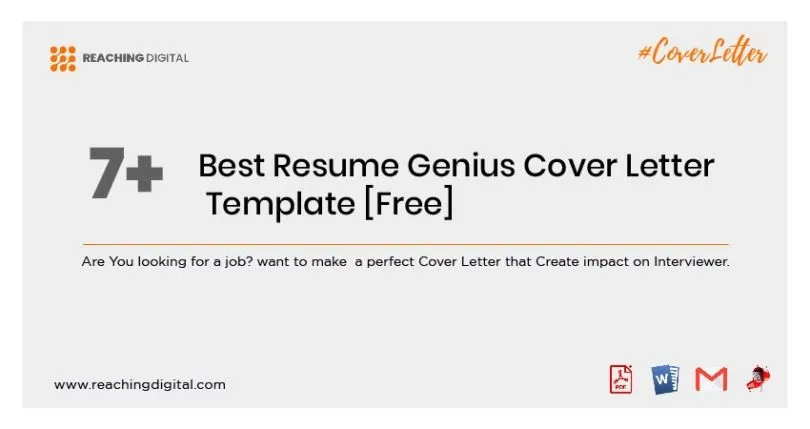Why a Cover Letter is Crucial for Resume Success
In the competitive landscape of job applications, a cover letter can be the deciding factor in whether your resume gets a second look. While your resume provides a snapshot of your qualifications, a cover letter offers the opportunity to tell a story, explain your motivations, and showcase your personality. Resume Genius recognizes the importance of a well-crafted cover letter in making a strong first impression. It’s your chance to connect with the hiring manager on a personal level and demonstrate why you’re the perfect fit for the role. A cover letter allows you to highlight specific skills and experiences that align with the job requirements, setting you apart from other applicants. It’s also an opportunity to address any potential gaps in your resume or explain career transitions. By investing time in crafting a compelling cover letter, you significantly increase your chances of landing an interview and ultimately, securing the job.
Highlighting Your Skills and Experience
Your cover letter is the perfect place to shine a spotlight on the skills and experiences most relevant to the job. Go beyond simply listing your qualifications; instead, provide specific examples of how you’ve utilized your skills to achieve results. Think of it as a narrative – illustrate situations where you demonstrated your abilities, detailing the actions you took and the positive outcomes. Resume Genius advises selecting a few key skills from the job description and weaving them into your cover letter. Use action verbs to describe your accomplishments and quantify your achievements whenever possible. This approach not only demonstrates your capabilities but also shows the hiring manager that you understand the requirements of the role and are prepared to excel in it. Remember to keep the focus on what you can bring to the company, not just what you’ve done in the past.
Matching Skills to Job Requirements
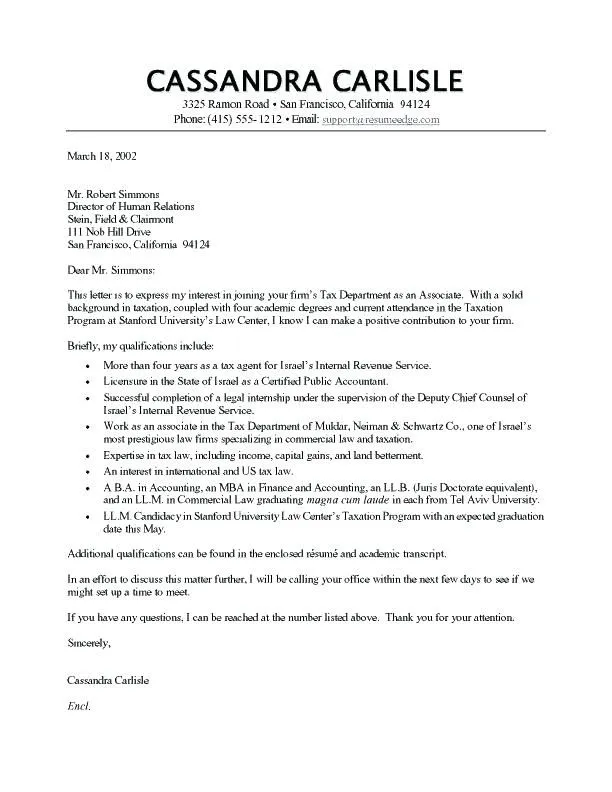
Carefully review the job description to identify the skills and experiences that the employer values most. Then, in your cover letter, explicitly connect your qualifications to these requirements. This might involve using similar language to the job posting and providing examples of how you’ve successfully applied those skills in previous roles. Demonstrate that you understand the company’s needs and are equipped to meet them. Do not just list your skills; show, don’t tell. Instead of writing “I have strong communication skills,” write “In my previous role, I successfully led presentations to audiences of over 50 people, clearly communicating complex information.” This approach instantly makes your application more persuasive and shows the hiring manager you’re a strong match.
Quantifying Accomplishments
Wherever possible, use numbers and data to quantify your accomplishments. Instead of saying you “improved sales,” say you “increased sales by 15% in one quarter.” This provides concrete evidence of your abilities and demonstrates the value you brought to previous employers. Quantifiable achievements make your cover letter more credible and memorable. When describing your achievements, provide context. Explain the situation, the actions you took, and the measurable results. For example, instead of saying “Managed social media accounts,” write “Managed social media accounts, increasing follower engagement by 20% and driving a 10% increase in website traffic.” This level of detail will help your application stand out.
Crafting a Compelling Opening
The opening of your cover letter is critical. It’s your first and often only chance to make a positive impression. Start with a strong hook that grabs the reader’s attention immediately. Avoid generic greetings or overly formal language. Instead, aim for a tone that is both professional and engaging. State your purpose clearly and concisely. Let the hiring manager know the specific position you’re applying for and where you found the job posting. This immediately establishes your intent and helps the reader understand the context of your application. A well-crafted opening sets the tone for the rest of your letter and encourages the reader to continue reading. Consider personalizing your opening by mentioning something specific about the company or the role that excites you. This shows that you’ve done your research and are genuinely interested in the opportunity.
Grabbing the Reader’s Attention
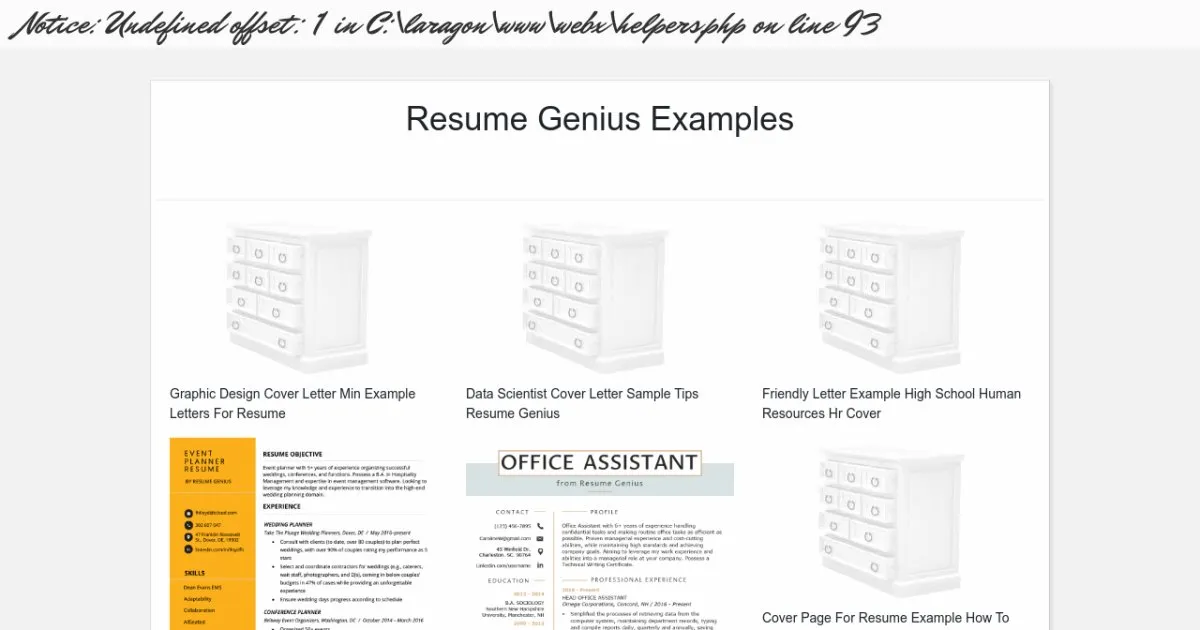
Start with a captivating opening sentence. This could be a brief anecdote, a surprising fact related to the company or industry, or a statement about why you’re excited about the role. The goal is to pique the reader’s curiosity and make them want to learn more about you. Avoid generic phrases. Instead of writing “I am writing to express my interest…”, try something more impactful, such as “I was thrilled to see the opening for [Job Title] at [Company Name], as my passion for [related field] aligns perfectly with your company’s mission.” Or, if you have a relevant personal connection, use it. For example, “Having followed [Company Name]’s work on [specific project], I was particularly excited to see the opening for [Job Title].”
Stating Your Purpose
Clearly state the position you are applying for. Make it easy for the hiring manager to understand your intent. If you’re applying for a specific job, mention the job title. If you found the job posting on a specific website or platform, mention that too. Briefly explain why you’re interested in the role and the company. Your goal here is to signal your intention and show that you have a clear understanding of what you’re applying for. This is essential, as the reader might be reviewing many applications. Avoid vague phrases. Do not start with an overly generic greeting or an unclear statement of purpose. Make your intention known from the very beginning.
Showcasing Your Value Proposition
Your cover letter is an opportunity to explain what makes you unique and valuable to the company. Think of it as your personal sales pitch. Highlight the skills and experiences that set you apart from other candidates. Focus on your achievements and the value you can bring to the role. Demonstrate how your skills align with the job requirements and the company’s goals. Use specific examples to illustrate your points. Provide evidence of your past successes. Explain the outcomes of your actions. Show the hiring manager not just what you’ve done, but the impact you’ve had. A compelling value proposition will make your application more memorable and increase your chances of landing an interview.
Tailoring Your Cover Letter
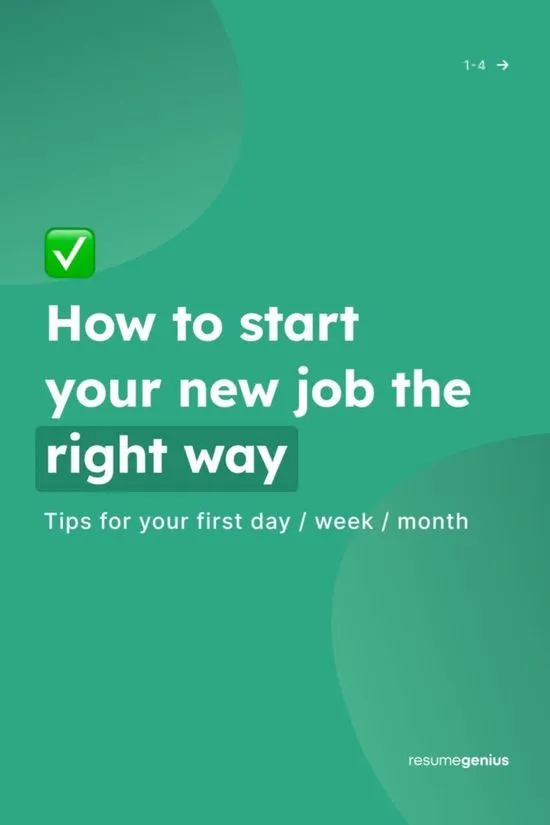
Do not send a generic cover letter to every job you apply for. Tailor each cover letter to the specific job and company. Show that you’ve done your research and understand the company’s needs. Address the specific requirements of the job. Highlight the skills and experiences that are most relevant to the role. Customizing your cover letter will demonstrate your genuine interest in the position. Research the company and the hiring manager. Show that you know what the company does, what their values are, and what challenges they may be facing. Personalizing your letter can show that you are taking the initiative to understand the company and how you may fit in it.
Researching the Company
Before you start writing, research the company thoroughly. Visit their website, read their mission statement, and explore their social media profiles. Understand the company culture, values, and recent news. Tailor your cover letter to demonstrate your understanding of the company’s goals and how your skills align with them. Look for information about the hiring manager. If possible, find out their name and title. Addressing the cover letter to a specific person shows that you’ve done your homework and are genuinely interested in the role. Demonstrate your knowledge of the company in your cover letter. Mention specific projects, initiatives, or products that resonate with you. Show the hiring manager that you understand the company’s business and the challenges they may be facing.
Using Keywords
Incorporate keywords from the job description into your cover letter. Many companies use applicant tracking systems (ATS) to scan resumes and cover letters for relevant keywords. By including keywords, you increase the likelihood that your application will be noticed. Read the job description carefully. Identify the most important keywords and phrases. Weave these keywords naturally into your cover letter. Do not stuff your letter with keywords, as this can make it sound unnatural and forced. Use keywords strategically and contextually. Ensure that they align with your skills and experience. Using keywords can significantly improve your chances of getting your application seen by a human. It is important to show you are qualified for the role and match the skills outlined on the job description.
Formatting for Readability
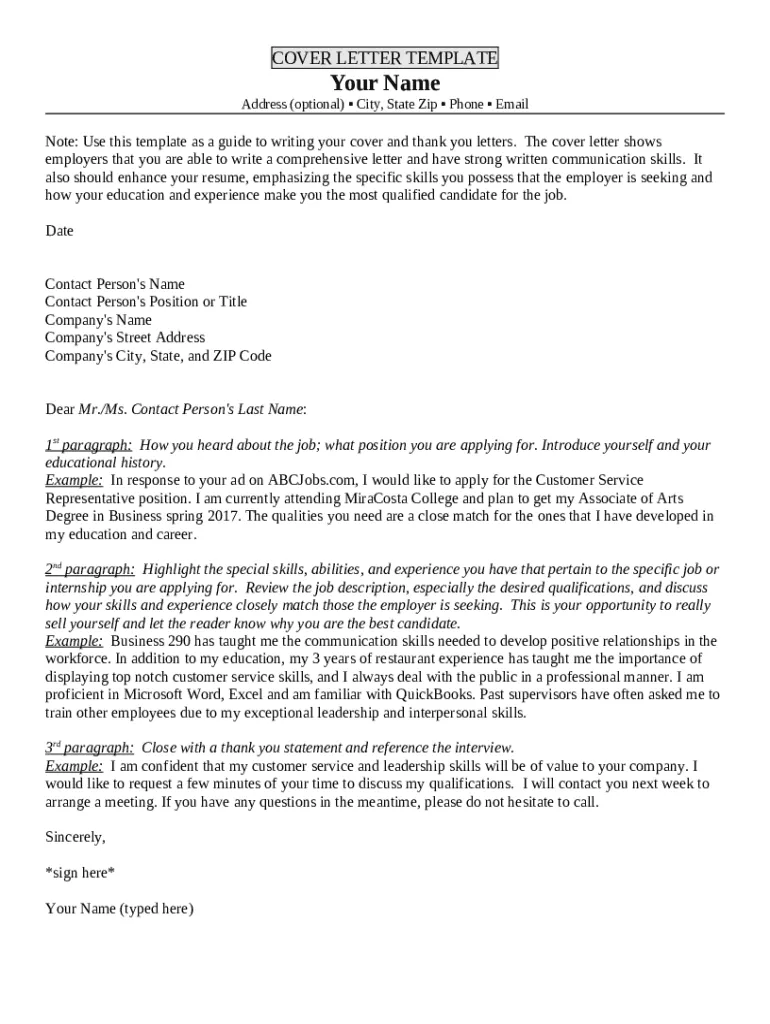
A well-formatted cover letter is easy to read and visually appealing. It should be free of clutter and easy on the eyes. Use clear headings, bullet points, and plenty of white space to break up the text. Maintain a consistent font style and size throughout the letter. Keep your paragraphs concise and focused. Format your cover letter in a professional manner. Use a clear, easy-to-read font, and maintain consistent margins. Avoid excessive use of bolding, italics, and underlining. Ensure your formatting aligns with the style guidelines.
Choosing the Right Font
Select a professional and easy-to-read font such as Arial, Calibri, or Times New Roman. Avoid overly decorative or unconventional fonts. The font should be consistent throughout your entire cover letter and resume. Choose a font size between 10 and 12 points for optimal readability. The goal is to make your cover letter as accessible and easy-to-read as possible. The font is an important part of your cover letter, making sure it is professional is key to securing an interview.
Keeping it Concise
Keep your cover letter concise and to the point. Hiring managers are busy and often skim cover letters quickly. Aim for a letter that is no more than one page in length. Focus on the most relevant information and avoid unnecessary details. Be direct and avoid wordiness. Get to the point quickly and make sure every sentence adds value. Remove any irrelevant information. Only include details that support your qualifications and align with the job requirements. Conciseness demonstrates respect for the hiring manager’s time and helps your most important points stand out.
Closing with Confidence
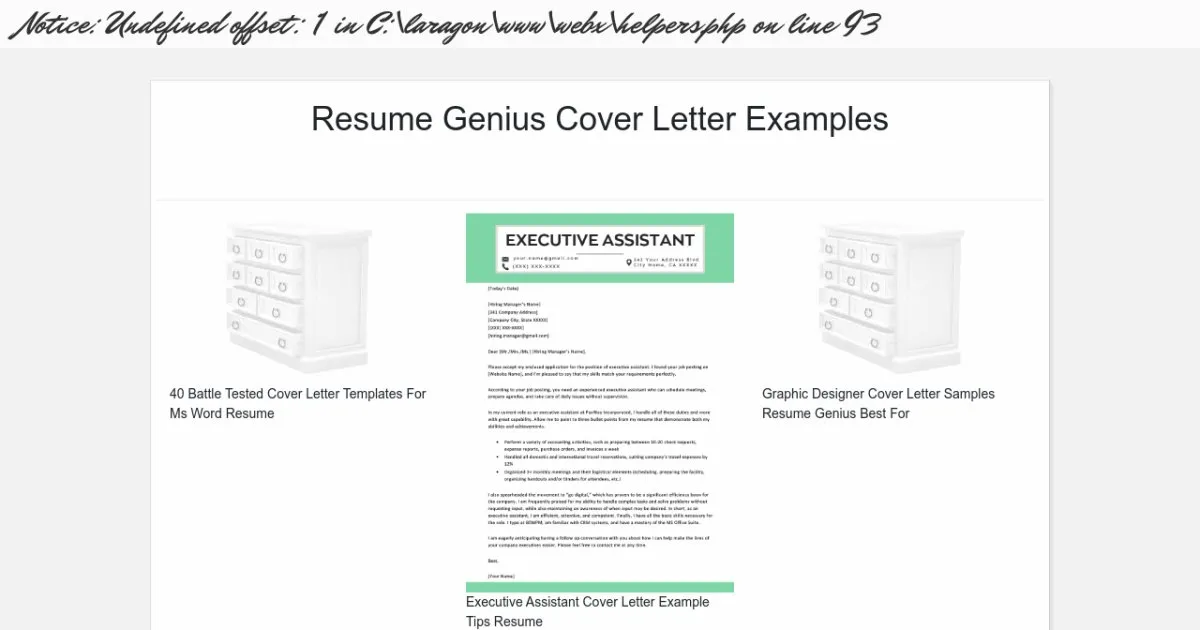
End your cover letter with a confident and professional closing. Reiterate your interest in the role and express your enthusiasm for the opportunity. Provide a clear call to action. Make it easy for the hiring manager to contact you. Use a polite and professional closing such as “Sincerely” or “Best regards.” Your closing should leave a positive impression and encourage the hiring manager to take the next step.
Expressing Gratitude
Thank the hiring manager for their time and consideration. Express your gratitude for the opportunity to apply and reiterate your enthusiasm for the role. It is important to show that you value the time and effort they put into reading your cover letter. Be sincere in your expression of gratitude and show that you understand and appreciate their position. The closing is your final opportunity to make a positive impression.
Including a Call to Action
End your cover letter with a clear call to action. Make it easy for the hiring manager to take the next step. Invite them to contact you for an interview. Provide your phone number and email address for easy reach. Indicate your availability for an interview. Make it clear that you are ready and willing to discuss your qualifications further. Include your contact information in your closing. It’s important the hiring manager is able to reach you to discuss the role further. This helps to ensure you are able to secure an interview and get you one step closer to securing the job.
Proofreading and Editing
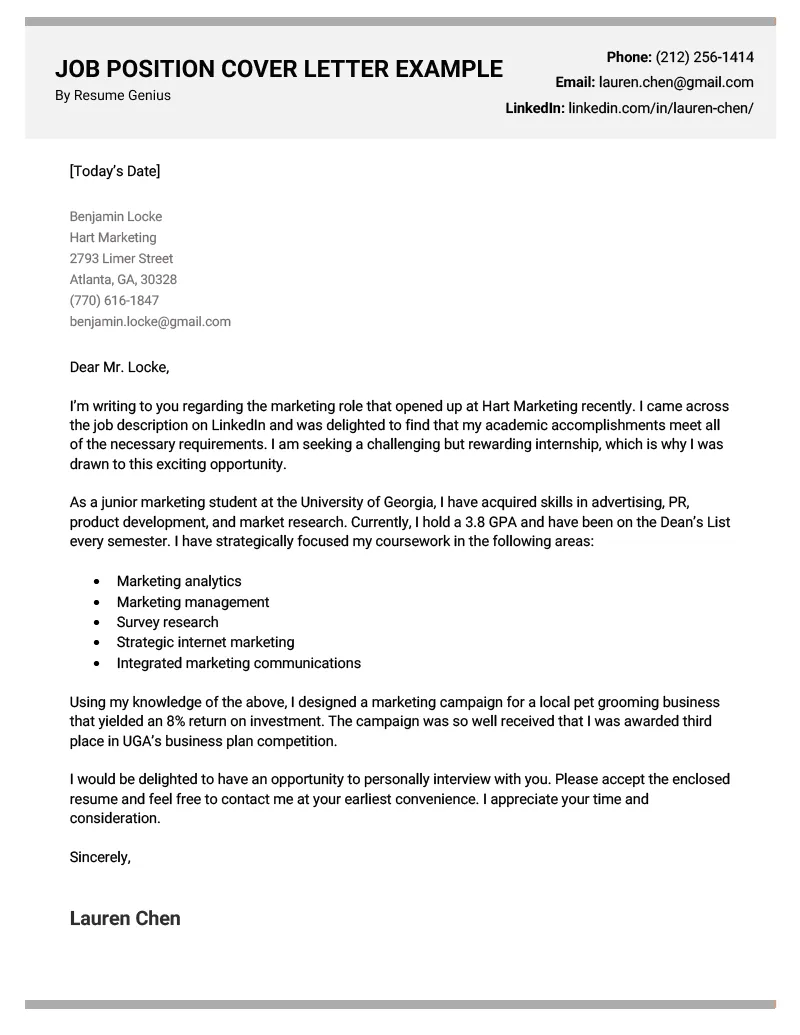
Before sending your cover letter, proofread and edit it carefully. Ensure that your letter is free of errors in grammar, spelling, and punctuation. A polished cover letter demonstrates your attention to detail and professionalism. Read through your cover letter multiple times. Check for any typos or grammatical errors. Have someone else review your cover letter. Ask a friend, family member, or career counselor to read it and provide feedback. A fresh pair of eyes can often catch errors that you might miss. Make sure you have corrected any errors. Ensure your cover letter is as perfect as it can be.
Checking for Errors
Pay close attention to details such as grammar, spelling, and punctuation. Typos and grammatical errors can undermine your credibility and create a negative impression. Review your cover letter multiple times. Proofread slowly and carefully, reading each sentence multiple times. Use grammar and spell-check tools. These tools can help catch many common errors, but they are not foolproof. A human editor is always best. Look for common mistakes, such as incorrect word usage, subject-verb agreement errors, and punctuation issues. A polished cover letter shows that you care about the quality of your work.
Getting Feedback
Ask a friend, family member, or career counselor to review your cover letter. Getting feedback from someone else can provide valuable insights and help you identify areas for improvement. Ask the reviewer to focus on clarity, conciseness, and overall impact. Are your skills and experiences clearly presented? Does your letter make a strong impression? Ask for honest feedback and be open to suggestions. Consider revisions based on feedback. Use the feedback to refine your cover letter and make it the best it can be. Receiving feedback is a vital part of the writing process. Take all of the feedback to heart.
